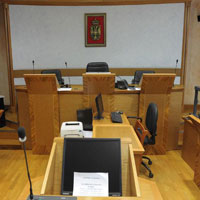Regarding the presentation of the Prosecutorial Strategy for the Investigation and Prosecution of War Crimes in the Republic of Serbia in the period 2018 to 2023
 On Monday, March 12, 2018, the Office of the War Crimes Prosecutor (OWCP) presented the Draft Prosecutorial Strategy for the Investigation and Prosecution of War Crimes in the Republic of Serbia for the period 2018-2023 (Draft), in accordance with the obligations of the Action Plan for Chapter 23 and the National War Crimes Prosecution Strategy (National Strategy). The Humanitarian Law Center (HLC) considers that the method of presenting the draft was not transparent, and that the draft strategy does not offer any solution to overcoming the key shortcomings in the previous work of the OWCP, and fails to determine adequate measures for achieving the primary goal the more efficient prosecution of war crimes.
On Monday, March 12, 2018, the Office of the War Crimes Prosecutor (OWCP) presented the Draft Prosecutorial Strategy for the Investigation and Prosecution of War Crimes in the Republic of Serbia for the period 2018-2023 (Draft), in accordance with the obligations of the Action Plan for Chapter 23 and the National War Crimes Prosecution Strategy (National Strategy). The Humanitarian Law Center (HLC) considers that the method of presenting the draft was not transparent, and that the draft strategy does not offer any solution to overcoming the key shortcomings in the previous work of the OWCP, and fails to determine adequate measures for achieving the primary goal the more efficient prosecution of war crimes.
On the basis of the Action Plan for Chapter 23, a Prosecutorial Strategy should have been adopted in the first half of 2016. As its adoption has been delayed by two years, the HLC believes the proposed draft should be much more specific as regards content and more precise in general.
The National Strategy envisaged that the drafting and adoption of the Prosecutorial Strategy would be followed by a “transparent consultation process with all relevant entities.” However, the OWCP organised the presentation of the Draft Prosecutorial Strategy for a very narrow circle of persons and without the presence of the media. The fact that the OWCP did not have the serious intention to organise a transparent process in which views on the Draft Prosecutorial Strategy could be expressed is also indicated by the fact that the OWCP submitted the draft to the HLC on the afternoon of Friday, March 9, when its presentation was scheduled for Monday, March 12; and that the deadline for submitting written comments on the Prosecutorial Strategy was Wednesday March 14. The non-transparent manner in which the draft was presented to interested stakeholders, as well as the extremely short deadline for submitting comments on this important strategic document of the OWCP, casts grave doubts as to the sincerity of the OWCP’s intention to adopt a prosecutorial strategy which will pave the way for the prosecution of war crimes in the upcoming period.
In addition to the non-transparent way of presenting the draft, the HLC considers that the proposed draft also contains numerous deficiencies that leave the OWCP with the possibility for future reinterpretations of its obligations, but also of the expected results.
The most obvious shortcoming of the proposed draft is the absence of clear criteria that would guide the OWCP in determining which cases will have priority in prosecution during the following period, although the National Strategy stipulates that these criteria will be closely defined by the Prosecutorial Strategy. Thus, the draft only refers to the criteria defined by the National Strategy, without any closer definition or elaboration. The absence of clear criteria for determining priority cases can lead to a continuation of the OWCP practice of prosecuting only the less demanding war crimes cases. Namely, in the previous period the HLC made remarks on the work of the OWCP, which were primarily related to the policy of processing less demanding cases involving a smaller number of victims, cases related to isolated and minor incidents, and to the absence of cases in which the defendants are high-ranking officers. Likewise, raising under-prepared indictments leading to acquittals constituted an irrational spending of the OWCP’s already limited resources. For this reason, the HLC recalls that it is the OWCP’s responsibility to collect evidence of high probative value, to prosecute primarily cases with a large number of victims, and to accuse high-ranking perpetrators from the ranks of the army and the police.
Another observation that can be made about the draft is that it is not possible to clearly identify from the text what are the exact actions to be taken by the OWCP, nor the deadlines by which the activities will be implemented. Thus, no deadline is set by which the OWCP will determine the criteria that will be taken into account when determining the priorities in the processing, or by which the five-year investigation plan will be determined, or by which the list of cases of the prosecutors’ offices of general jurisdiction will be fully drawn up, etc.
Also, the Draft Prosecutorial Strategy lacks key indicators of success, i.e. of progress in the prosecution of war crimes, both quantitative (e.g. number of convictions, number of indictments against high-ranking perpetrators, number of indictments with a higher number of victims) and qualitative (e.g. improved regional cooperation, reduced number of persons missing as a result of the proactive work of the War Crimes Prosecutor’s Office). Without such guidelines, it will not be possible to monitor the effectiveness of the Prosecutorial Strategy, or the effectiveness of the OWCP’s work.
The HLC recalls that the drafting and adoption of the Prosecutorial Strategy should be at the core of the efforts to increase the efficiency of war crimes proceedings, bearing in mind that the OWCP is the initiator of criminal proceedings, as well as the generator of the activities of other state bodies engaged in the processing of war crimes. The next five-year period, which is the period of validity of the Prosecutorial Strategy, is crucial to the combat against impunity. Although war crimes never become obsolete, the life expectancy of the suspects, but also of the victims and witnesses, will make every investigation and prosecution more difficult as the years go by.
The HLC believes that the OWCP’s Prosecutorial Strategy must be the backbone of the war crime processing policy, since the quality and quantity of prosecutorial activity in the coming period also depends on the successful implementation of the National Strategy, as the umbrella strategy for the prosecution of war crimes in Serbia.
On March 14, 2018, the HLC sent detailed comments on the Draft Prosecutorial Strategy for the Investigation and Prosecution of War Crimes in the Republic of Serbia to the Office of the War Crimes Prosecutor.







